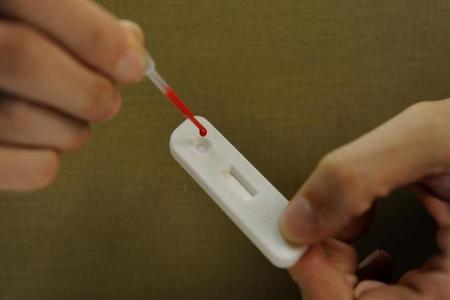MOH reviewing HIV disclosure law
A law requiring those with the human immunodeficiency virus (HIV) to inform their sexual partners of the risk of HIV transmission or face jail time is being reviewed, said the Ministry of Health (MOH).
This is as studies have shown that people living with HIV who have been compliant with treatment and have maintained a stable undetectable viral load have practically no risk of transmitting HIV to their sexual partners, MOH said in response to queries from The Straits Times.
The review opens up the possibility that such disclosures may no longer be prescribed – a change given that penalties were enhanced in 2008.
“MOH is conducting a review of the Infectious Diseases Act (IDA) following the White Paper on Singapore’s Response to Covid-19, and will take the latest scientific evidence into account when reviewing the sections on HIV to ensure continued relevance and alignment with our public health policy goals,” said its spokesman.
Infectious diseases and HIV experts that ST spoke to were of the view that the law, which was introduced in 1992, needed updating.
A section of the IDA currently requires those living with HIV to disclose this to their sexual partners before having sex, so that their partners can make an informed decision and take the necessary precautions to protect themselves.
In 2008, the maximum jail term for failing to do so was raised from two years to 10 years.
Culpability was also widened to include persons who do not know if they have HIV or Aids but who have reason to believe they have been exposed to significant risk of infection, such as if they have multiple sex partners.
The objective of the amendment was to promote condom use and regular HIV testing, while sending a strong message that no one has a right to put others at risk through irresponsible behaviour, said then Health Minister Khaw Boon Wan during the 2008 parliamentary debate on the amendment.
HIV attacks the immune system and acquired immune deficiency syndrome (Aids) is the final stage of its infection. Aids is fatal if left untreated.
While there is no cure for HIV, antiretroviral therapy can improve the immune system and suppress the viral load in a patient’s body to an undetectable level.
From 2019 to December 2023, six people were convicted for failing to disclose their HIV status to their sexual partners.
But advocacy groups and infectious diseases experts said the current law may be counterproductive to public health goals.
It is a very extreme minority who want to deliberately infect other people with HIV, but everyone should know that they can protect themselves from HIV by using condoms or taking PrEP.Dr Leong Hoe Nam, infectious disease specialist
In a Forum letter published in ST in November, Action for Aids Singapore president Roy Chan and the president of sex worker non-governmental organisation Project X, Dr Rayner Tan, argued that sexual health should be a shared responsibility between partners, regardless of their HIV status.
This includes adopting HIV-prevention strategies, like the proper use of condoms and HIV pre-exposure prophylaxis (PrEP). PrEP is a medicine that reduces one’s chances of getting HIV from sex or injection drug use.
Professor Chan and Dr Tan, who both specialise in HIV and sexually transmitted infections, also pointed to existing legislation outside the IDA that penalises deception and grievous harm to argue that a law governing HIV disclosure alone is unnecessary.
Dr Leong Hoe Nam, an infectious disease specialist at Mount Elizabeth Novena Hospital, is also of the view that the law should be repealed.
“It is a very extreme minority who want to deliberately infect other people with HIV, but everyone should know that they can protect themselves from HIV by using condoms or taking PrEP,” he said.
Dr Leong added that he advocates awareness, self-protection, safe sex, using oral quick tests and encouraging people to come forward and get tested.
In a February parliamentary reply, Health Minister Ong Ye Kung said the use of prophylaxis is a supplementary HIV-prevention option, as they are not fully effective nor do they protect against other sexually transmitted infections.
He cautioned against “sending the wrong signal that these drugs can substitute the recommended HIV-prevention methods, such as avoiding casual sex and correct use of condoms”.
Senior lecturer Ritu Jain at the Language and Communication Centre at Nanyang Technological University said she concurred with Prof Chan and Dr Tan.
A principal investigator for a National Centre for Infectious Diseases-funded study that interviewed 73 people, including 56 people living with HIV, Dr Jain told ST that the recently concluded study found that the law disincentivises testing and encourages a “don’t know, don’t tell” mindset, contrary to its aim.
Responding to ST’s queries, MOH said the current law accords choice and protection to the partner of someone with HIV, who can decide whether to engage in sexual activity, and, if so, to take precautions to reduce risk.
At the 2008 debate to amend the IDA, Mr Khaw said the Government’s intention behind enhancing the law was not to criminalise HIV-infected patients, but to push them to act more responsibly and not to hide behind the ignorance of their HIV status.
“We will only act if there is a complaint from an aggrieved victim, and only after a thorough investigation to establish the facts,” he added.
Get The New Paper on your phone with the free TNP app. Download from the Apple App Store or Google Play Store now


